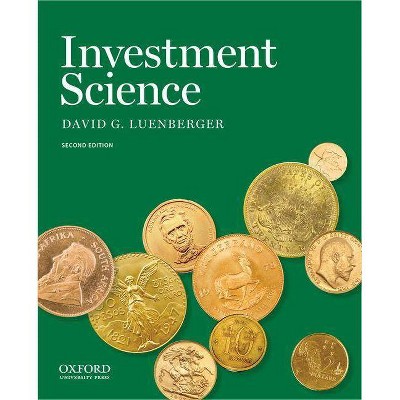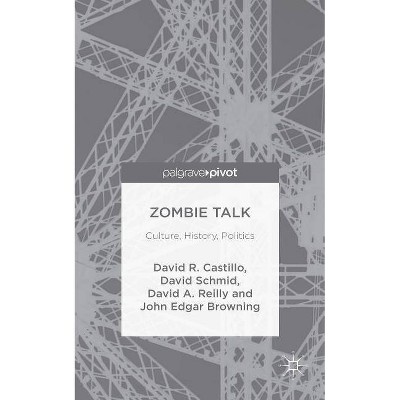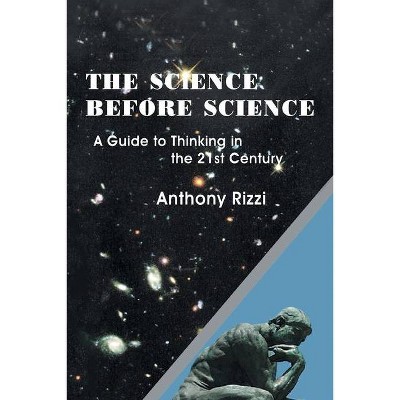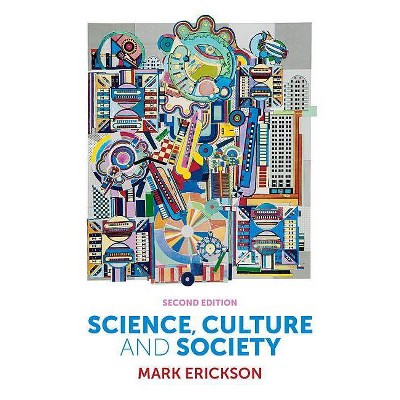Hot Talk, Cold Science - 3rd Edition by S Fred Singer & David R Legates & Anthony R Lupo (Hardcover)
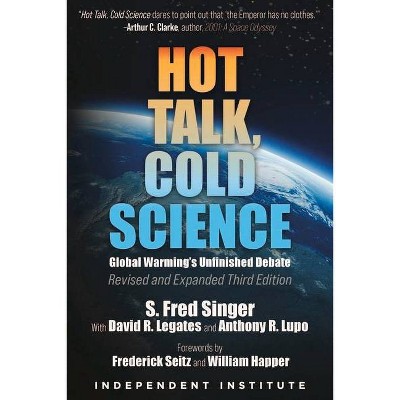
Similar Products
Products of same category from the store
AllProduct info
<p/><br></br><p><b> About the Book </b></p></br></br>"Incorporating recent developments in science, economics, and public policy, Hot Talk, Cold Science, 3rd Edition is a badly needed de-coding device to a sprawling, highly technical literature, giving readers a clear understanding of what scientists and policymakers know about climate change-and what they don't. By separating rhetoric from reality, this well-timed release allows readers to better detect and think beyond the hyperbole and propaganda all-too-common in media coverage of this heated subject. The stakes in this global debate, Dr. Singer reminds us, are monumental. With some calling for restrictions or carbon taxes to reduce the use of fossil fuels and get climate change under control, and others warning that impeding access to affordable energy would consign large segments of the world's population to deeper, more prolonged poverty, the only ground shared by all sides may be a burning sense of urgency for more research and education. By bringing vital but often neglected findings to the forefront of the reading public, Hot Talk, Cold Science: Global Warming's Unfinished Debate, 3rd Edition can play a critical part in stimulating fresh discussion on the most important scientific and policy issue of our times"--<p/><br></br><p><b> Book Synopsis </b></p></br></br>"In <b><i>Hot Talk, Cold Science, </i></b> Fred Singer looks at the issue of climate change the way a physicist should. He asks probing questions and offers reasoned possibilities. He notes the obvious weaknesses that others too often ignore.... Fortunately, some like Dr. Singer still prefer the joys and value of scientific inquiry." <br> --Richard S. Lindzen, <b>Alfred P. Sloan Professor Emeritus of Meteorology, M.I.T.</b> <p/> The revised and expanded third edition of <b><i>Hot Talk, Cold Science</i></b> forms the capstone of the distinguished astrophysicist Dr. S. Fred Singer's lucid, yet hard scientific look at climate change. <b>And the book is no less explosive than its predecessors--and certainly never more timely. </b> <p/> Singer explores the <b>inaccuracies in historical climate data</b> and the <b>failures of climate models</b>, as well as the impact of solar variability, clouds, ocean currents, and sea levels on global climate--plus factors that could mitigate <i>any</i> human impact on world climate. <br> Singer's masterful analysis decisively shows that the pessimistic, and often <b>alarming, global-warming scenarios</b> depicted in the media have <b>no scientific basis</b>. In fact, he finds that many aspects of increased levels of CO2, as well as any modest warming, such as a longer growing seasons for food and a reduced need to use fossil fuels for heating, would have a highly positive impact on the human race. <p/> As alarmists clamor to impose <b>draconian government restrictions on entire populations</b> in order to combat "climate change," this book reveals some other startling, stubborn contradictory facts, including: <p/> - <b>CO2 </b>has <i>not</i> caused temperatures or sea levels to rise beyond historical rates. <br> - <b>Severe storms </b>have <i>not</i> increased in frequency or intensity since 1970--neither have heat waves nor droughts. <br> - <b>Global "climate change" </b>is <i>not</i> harming coral reefs. <br> - Any <b>increases in CO2 concentrations</b> across huge time spans haven't <i>preceded</i> rising global temperatures, they've <i>followed</i> them by about 600 to 800 years--just the opposite of alarmist claims. <br> -<b>"Carbon" taxes and other "solutions"</b> to the global warming "crisis" would have severe consequences for economically disadvantaged groups and nations. <br> - <b>Alarmist climate scientists have hidden their raw temperature data</b> and deleted emails--then undermined the peer-review system to squelch debate. <p/> In sum, despite all the hot talk--and outright duplicity--<b>there is no "climate crisis"</b> resulting from human activities and <b>no such threat on the horizon</b>. <p/> With the assistance of renowned climate scientists David R. Legates and Anthony R. Lupo, Singer's <b><i>Hot Talk, Cold Science</i></b> is an essential, clear-headed book of scope and substance that no one who claims to value science, the environment, and human well-being can afford to ignore.<p/><br></br><p><b> Review Quotes </b></p></br></br><br>"<i>Hot Talk, Cold Science </i>is an excellent book on the politics and science of climate change." --Elliott D. Bloom, Professor Emeritus, Stanford Linear Accelerator Laboratory; Member of the team with Jerome I. Friedman, Henry W. Kendall and Richard E. Taylor who received the 1990 Nobel Prize in Physics<br><br>"<i>Hot Talk, Cold Science</i> by Fred Singer (with David Legates and Anthony Lupo), is one of the most important contributions undermining the economically and politically problematic and highly controversial scientific doctrine of man-made global warming." --Václav Klaus, former President, Czech Republic<br><br>""Drs. Singer, Legates, and Lupo bring science and reason to a debate that has increasingly been driven by panic and politics. Now more than ever, the public deserves Hot Talk, Cold Science's thorough scientific and economic analysis of the realities of our environment." --Thomas M. McClintock, U.S. Congressman; Member, House Natural Resources Committee<br><br>"As contentious as the climate issue was and is, I was always impressed by Fred Singer's gentle demeanor within that storm. I suppose he remained calm because he sought to ground his views in the actual evidence of climate observations. In his day, reproducible evidence was the foundation on which one was taught to test one's claims and he simply went about the business of checking out the latest theorized conjectures about the climate. Here in <i>Hot Talk, Cold Science</i>, he updates his findings regarding those conjectures, as well as giving a tour of the political landscape that melded itself to the climate-alarm agenda. His conclusions should give us all a modest sense of gentle calmness--that same calmness he carried to the end of his days." --John R. Christy, Director, Earth System Science Center, University of Alabama in Huntsville<br><br>"Drs. Singer, Legates, and Lupo uphold the vital method of scientific inquiry, which is the only way to improve the current, blurred description of the physical nature of the human impact on the terrestrial ecosystem. Nonetheless, the scientific questions about global warming are largely inseparable (properly so) from policy discussion. As Singer, Legates, and Lupo do, let's keep the debate scientifically sound and enlightening." --Sallie L. Baliunas, former Staff Astrophysicist, Harvard-Smithsonian Center for Astrophysics<br><br>"When debating environmental policy, we frequently hear from scientists, climate activists, and public officials who claim 'the science is settled' with regard to global warming. This book is a great reminder that the data are mixed at best. We should follow the science.<i> Hot Talk, Cold Science </i>provides the reader with important facts and evidence consistently and conveniently overlooked by climate alarmists, making clear the case on global warming is far from closed." --Ted Cruz, U. S. Senator; Chairman, Senate Subcommittee on Science and Space<br><p/><br></br><p><b> About the Author </b></p></br></br><b>S. Fred Singer</b> was one of the world's preeminent authorities on energy and environmental issues. A pioneer in the development of rocket and satellite technology, Dr. Singer designed the first satellite instrument for measuring atmospheric ozone and was a principal developer of scientific and weather satellites. Author of more than 400 technical articles in scientific, economics, and public policy journals, plus more than 400 articles in popular publications, including the <i>Wall Street Journal, New York Times, </i> and the <i>Washington Post, </i> Dr. Singer received his Ph.D. in physics from Princeton University. <p/><b>David R. Legates</b> is a research fellow at the Independent Institute, deputy assistant secretary of commerce for observation and prediction at the National Oceanic and Atmospheric Administration (NOAA), and professor of climatology in the Department of Geography at the University of Delaware. His research has appeared in such scientific journals as the<i> International Journal of Climatology, Journal of Geophysical Research, </i>and<i> Theoretical and Applied Climatology.</i> <p/><b>Anthony R. Lupo</b> is a research fellow at the Independent Institute and chairman and professor in the Department of Soil, Environmental, and Atmospheric Science at the University of Missouri (MU). An associate editor of the <i>Monthly Weather Review, </i> Dr. Lupo's peer-reviewed publications have appeared in such scientific journals as <i>Bulletin of the American Meteorological Society, International Journal of Biometeorology, </i>and<i> International Journal of Climatology.</i>
Price History
Price Archive shows prices from various stores, lets you see history and find the cheapest. There is no actual sale on the website. For all support, inquiry and suggestion messagescommunication@pricearchive.us
